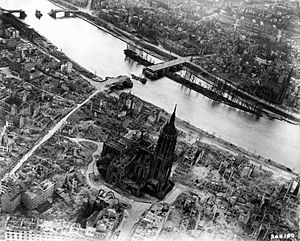Battle of Frankfurt facts for kids
Quick facts for kids Battle of Frankfurt |
|||||||
|---|---|---|---|---|---|---|---|
| Part of the Western Allied invasion of Germany, Advance to the Rhine in the Western Front of the European theatre of World War II | |||||||
 An aerial view of Frankfurt after the war. |
|||||||
|
|||||||
| Belligerents | |||||||
| Commanders and leaders | |||||||
| Units involved | |||||||
| 5th Infantry Division 6th Armored Division |
LXXX Corps | ||||||
| Strength | |||||||
| 2 divisions | 1-2 divisions (understrength) | ||||||
| Casualties and losses | |||||||
| unknown | 24 | ||||||
The Battle of Frankfurt was an important fight during World War II. It lasted for four days, from March 26 to 29, 1945. American forces fought to take control of the German city of Frankfurt am Main. The 5th Infantry Division led the attack, with help from the 6th Armored Division. German soldiers from the LXXX Corps defended the city.
Contents
Getting Ready for Battle
Crossing the Rhine River
The American 5th Infantry Division crossed the Rhine River on March 22, 1945. They quickly set up a safe area on the other side. This area is called a bridgehead.
By March 23, the division had pushed five miles further east. This put them only 14 miles southwest of Frankfurt. Other American armored units moved from this bridgehead. Some went north towards Trebur and Gustavsburg. Others went east towards Darmstadt.
Reaching Frankfurt
On March 25, the German commander in Darmstadt gave up. The 6th Armored Division and the 5th Infantry Division freed the city. By March 26, the 5th Division reached the southern edge of Frankfurt. They also captured the Rhine-Main airbase.
The Fight for Frankfurt
Entering the City
The 6th Armored Division joined the 5th Division. Together, they pushed through the southern parts of Frankfurt, known as Sachsenhausen. They reached the Main River. There, soldiers from the 5th Division found the Wilhelmsbruecke bridge. Today, this bridge is called the Friedensbruecke.
German engineers had tried to blow up the bridge on March 25. They wanted to stop the American forces. But their attempt failed, and the bridge was mostly still standing.
Crossing the Bridge
On March 27, American troops from the 5th Division crossed the Wilhelmsbruecke. They faced heavy enemy fire. American tanks helped by firing their cannons. After crossing, the soldiers entered the northern part of the city.
Street by Street Fighting
The two American divisions then fought German soldiers in the city. This was fierce house-to-house combat. They slowly pushed their way through the city. They moved north and east.
On March 27, Allied attacks killed the local German commander. This made it harder for the German military to fight in the city.
City Under American Control
By March 29, the city of Frankfurt was under American control. American engineers quickly built a temporary bridge. This pontoon bridge was next to the damaged Wilhelmsbruecke.
At first, some German soldiers wanted to set up machine gun positions. But citizens of Frankfurt convinced them to leave the city. This helped to avoid more fighting and save lives. The remaining German soldiers were pushed north and out of Frankfurt by the American troops.
What Happened Next
After the Battle
AFN Luxembourg, a radio station, announced that Frankfurt was free. However, small fights continued until April 4. Lee Miller, a war reporter, was with General Patton's Third Army. She was one of the first to report about Frankfurt's freedom in the U.S. press. The Stars & Stripes newspaper also reported the city as liberated on March 30.
After taking Frankfurt, the 5th Division rested for a few days. On April 7, they were ordered to move north. They went to help the III Corps of the First Army in the Ruhr Pocket.

